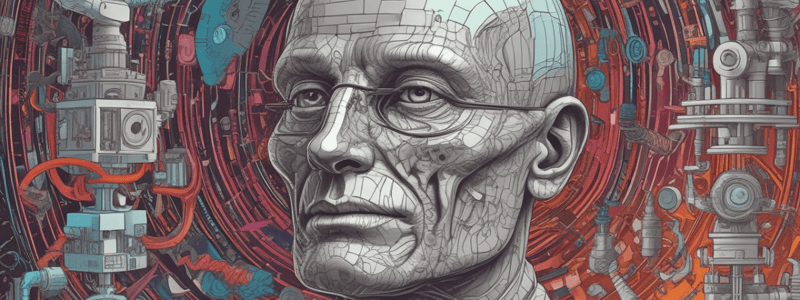Podcast
Questions and Answers
What is the key difference between the empiricist and rationalist views on the mind?
What is the key difference between the empiricist and rationalist views on the mind?
- Empiricists believe the mind is entirely shaped by external sensory experience, while rationalists believe the mind has innate structures and principles.
- Empiricists believe the mind is passive and acts automatically on sensations, while rationalists believe the mind is active and uses sensory information. (correct)
- Empiricists believe the mind can only store sensory data, while rationalists believe the mind can add to and transform sensory information.
- Empiricists believe the mind is inherently logical, while rationalists believe the mind relies on induction from experience.
Why do rationalists consider mathematics to be so important?
Why do rationalists consider mathematics to be so important?
- Mathematics is a purely rational discipline based on logical deduction and rules. (correct)
- Mathematics provides empirical data that can be used to understand the world.
- Mathematics allows empiricists to inductively derive universal principles.
- Mathematics is the language in which the laws of nature are written.
What was Baruch Spinoza's key belief that led to his excommunication?
What was Baruch Spinoza's key belief that led to his excommunication?
- Spinoza believed that God, matter, and the mind were all aspects of the same substance. (correct)
- Spinoza believed that the mind was entirely passive and automatically processed sensations.
- Spinoza believed that sensory experience was the only source of true knowledge.
- Spinoza believed in the separation of God, matter, and the mind.
How did Spinoza's views on the relationship between God, matter, and the mind differ from Descartes'?
How did Spinoza's views on the relationship between God, matter, and the mind differ from Descartes'?
How do empiricists and rationalists differ in their views on the role of logic and reasoning?
How do empiricists and rationalists differ in their views on the role of logic and reasoning?
How do empiricists and rationalists differ in their views on the origin of moral principles?
How do empiricists and rationalists differ in their views on the origin of moral principles?
What was the ultimate goal of the philosopher discussed in the text?
What was the ultimate goal of the philosopher discussed in the text?
How did the philosopher view the relationship between mind and body?
How did the philosopher view the relationship between mind and body?
What did the philosopher believe about the concept of free will?
What did the philosopher believe about the concept of free will?
What is considered the highest pleasure?
What is considered the highest pleasure?
How did the philosopher view emotions and passions?
How did the philosopher view emotions and passions?
In what way did the philosopher connect pleasure with survival?
In what way did the philosopher connect pleasure with survival?
What philosophical concept did the philosopher embrace regarding God and nature?
What philosophical concept did the philosopher embrace regarding God and nature?
'Mind-Body double aspectism' theory proposed by the philosopher implies that ________.
'Mind-Body double aspectism' theory proposed by the philosopher implies that ________.
'Panpsychism', as discussed in the text, asserts that ________.
'Panpsychism', as discussed in the text, asserts that ________.
Flashcards are hidden until you start studying
Study Notes
Empiricism vs. Rationalism
- Empiricism relies on sensory experience as the foundation of knowledge, while rationalism emphasizes reason and logic as primary sources of knowledge.
Rationalism and Mathematics
- Rationalists consider mathematics essential because they see it as a system of knowledge derived purely from reasoning, independent of sensory experience.
Spinoza's Excommunication
- Baruch Spinoza was excommunicated for his belief that God and nature are one and the same, a view seen as pantheistic and contradicting traditional Jewish beliefs.
Spinoza vs. Descartes: God, Mind, and Matter
- Spinoza differed from Descartes by asserting that God and nature are identical, unlike Descartes' separation of God as a distinct entity from the material world.
- Spinoza believed mind and matter are two aspects of one and the same substance, whereas Descartes saw them as distinct entities.
Empiricism vs. Rationalism: Logic and Reasoning
- Empiricists believe logic and reasoning are tools to organize and interpret sensory data, while rationalists see them as the primary means to acquire knowledge.
Empiricism vs. Rationalism: Moral Principles
- Empiricists contend moral principles are derived from experience and societal norms, while rationalists believe they are based on reason and universal truths.
The Philosopher's Goal
- The ultimate goal of the philosopher discussed in the text was achieving a state of intellectual liberation.
Mind-Body Relationship
- The philosopher believed that mind and body are not separate but rather two aspects of the same substance, interacting and influencing each other.
Free Will
- The philosopher rejected the concept of free will, believing that human actions are determined by the underlying causal laws of nature.
Highest Pleasure
- The highest pleasure, according to the philosopher, is the intellectual understanding of God and nature.
Emotions and Passions
- The philosopher viewed emotions and passions as disturbances of the mind, hindering the pursuit of intellectual understanding.
Pleasure and Survival
- The philosopher connected pleasure to survival, understanding that it motivates organisms to seek what contributes to their well-being.
God and Nature
- The philosopher embraced the philosophical concept of pantheism, where God is seen as identical with nature, not separate from it.
- Spinoza's 'Mind-Body double aspectism' theory implies that mind and body are not separate but different aspects of the same substance.
- The concept of Panpsychism, as discussed in the text, asserts that consciousness is not limited to humans and animals but permeates all matter in the universe.
Studying That Suits You
Use AI to generate personalized quizzes and flashcards to suit your learning preferences.




